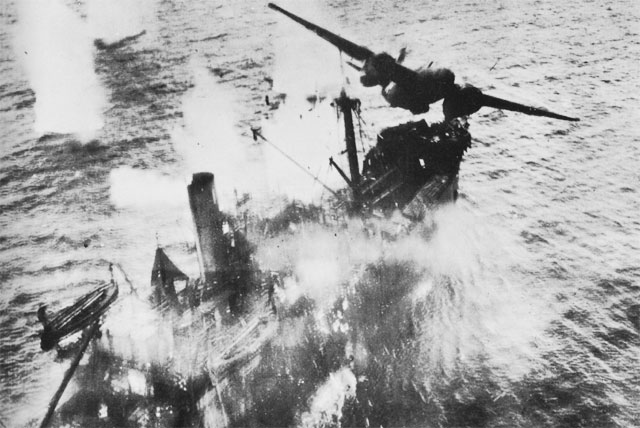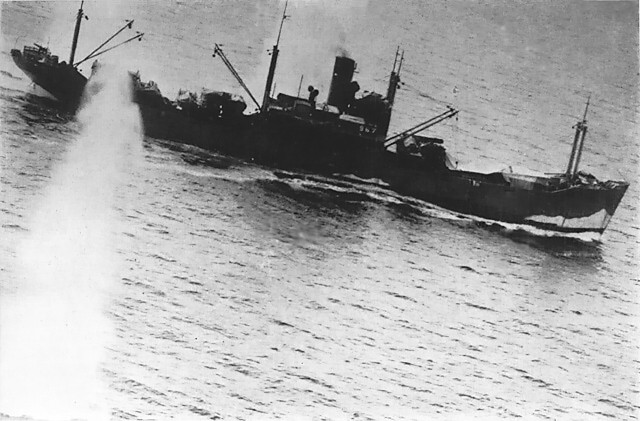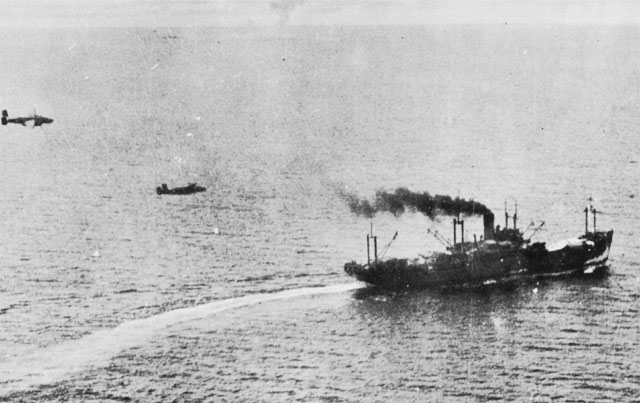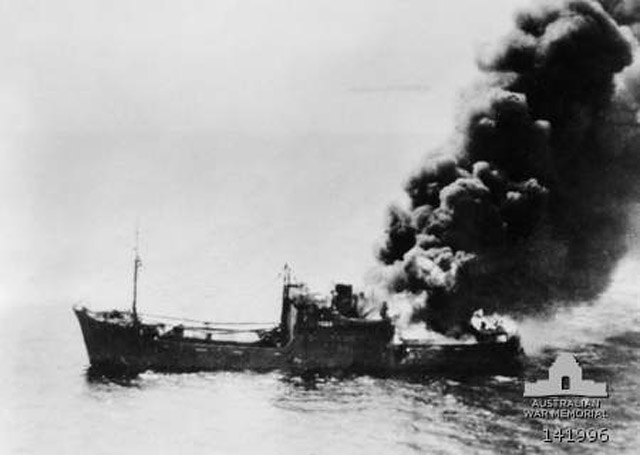Air Operations, CBI
BURMA- 7 7th Heavy Bomb Group B-24s attack docks and a warehouse at Ahlone.
- 6 B-24s attack the railroad roundhouse at Maglwagon.
- 9 B-24s attack a bridge at Pazundaung.
- 6 341st Medium Bomb Group B-25s attack a military camp and storage area at Lamaing.
- 24 B-25s attack Myitkyina.
Air Operations, Europe
BOMBER COMMANDEvening Ops:
- In minelaying ops, 60 aircraft operate on coastal areas between Texel and the Gironde River. 2 Wellingtons and 1 Lancaster are lost. 6 Mosquitos are sent to the Ruhr with one scoring direct hits in the middle of the main Krupps factory.
- There are no losses.
Air Operations, Pacific
Spitfires intercept Japanese bombers over Darwin, taking the raiders by surprise. 6 out of 15 are shot down.
[Air Operations, Sicily
38 NASAF B-17s attack the port facilities at Palermao during the afternoon destroying drydocks and ship-building facilities and setting 5 ships on fire. A 1st Fighter Group P-38 escort pilot downs and Italian Air Force Mc-200 over Palermo.
[Air Operations, Southwest Pacific
8 43rd Heavy Bomb Group B-17s attack a Japanese Navy convoy of 8 transports and 8 destroyer-transports in the Bismarck Sea with 1,000-pound bombs from 6,500 feet. Numerous hits are thought to be scored and 2 transports are claimed as sunk. A second flight of 20 B-17s claims two direct hits and 4 near misses and leaving behind 3 burning transports and cargo vessels. At nearly dusk, as the convoy is appoaching the Vitiaz Strait, 11 43rd Heavy Bomb Group B-17s deliver the final attack of the day, claiming 2 hits for 43 bombs and a vessel left in sinking condition. In all, for the 3 B-17 attacks, 1 transport is confirmed as sunk and others are claimed as sunk.
Air Operations, Tunisia
- 9 17th Medium Bomb Group B-26s, escorted by 82nd Fighter Group P-38s, conduct a bombing attack on the La Hencha bridge at a mere 60 feet through heavy flak and determined oppostion by Luftwaffe fighers. The bridge is utterly demolishted. Escorting P-38 pilots of the 82nd Fighter Group's 96th Fighter Squadron down 5 Bf-109s.
- 2 B-26s are lost, 2 damaged beyond repair
- NATAF fighters attack German Army tanks, troops, and motor vehicles northeast of Bedja and south of Mateur.
Battle of the Bismarck Sea
For the next three days this running battle takes place. A Japanese convoy of 8 transports carrying 7,000 troops of Gen Nakano's 51st Div, escorted by 8 destroyers and led by Adm Kimura is sighted en route from Rabaul to Lae. Having been forewarned of the convoy by ULTRA intelligence, it is attacked by planes from Gen Kenney's 5th Air Force on all three days, but especially on March 3. PT-Boats join the attack on March 4. All the transports and 4 destroyers, Asashio, Arashio, Tokitsukaze, and Shirayuki, and at least 3,500(6,000?) men are lost with only about 950 making it to New Guinea. In the air the Australians and Americans lose 5(6?) planes but shoot down 25. The Japanese regard the battle as a major disaster and a serious setback to their prospects in New Guinea.
|
|
|
|
Eastern Front
Over the next 3 days Panzers destroy the Russian 3rd Tank Army near Kharkov. Mussolini issues an Order of the Day announcing repatriation of the Italian Expeditionary Force (Corpo Spedizionario Italiano) 'to rest and have their ranks refilled'.
Rzhev, the strongly fortifies German base, is evacuated by the German Army Group Center.
SOUTHERN SECTORThe Germans move to strike at the 3rd Tank Army. SS Panzer Corps attacks from both the east and west. The remnants of the army's cavalry corps, having already suffered heavy losses, attempt to escape north but the remainder of the army is isolated.
The III and XL Panzer Corps attack along a line from the Bakhumutka River to Voroshilovgrad, compelling the 1st and 3rd Guards Armies to pull back over the Donets.
An M-3 Grant tank, Vyazma, Russia |
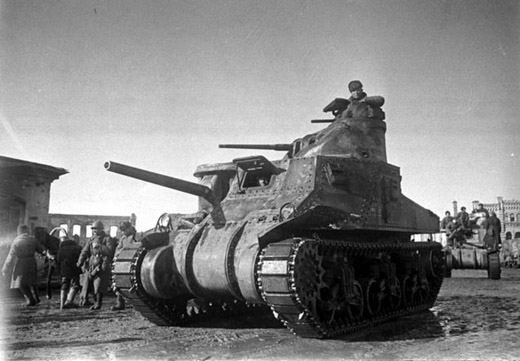 |
German Raiders
The German auxiliary cruiser Michel arrives at the port of Kobe, Japan to end her first war cruise.
[North Africa
TUNISIAAmerican forces re-enter Sbeitla and move on to Feriana. Farther north the British hold off German attacks.
In the British 1st Army's V Corps area, the Germans renew their attack on the northern flank along the Mateur-Tabarka road near Jefna and force the 139th Brigade, 46th Div, back to Sedjenana. The US II Corps is directed to begin a limited offensive on the southern flank of the British 1st Army not later than March 15th in order to divert enemy forces from the British 8th Army area, gain forward airfields from which the 8th Army's offensive against the Mareth Line can be supported, and establish an alternative supply line for the 8th Army.
In the British 8th Army area, the New Zealand 2nd Div concentrates south of Médenine after having been rushe forward from Tripoli.
[Pacific
The US submarine Thresher (SS-200) sinks the Japanese fleet tanker Toen Maru (5232t) in southern Makassar Strait.
[